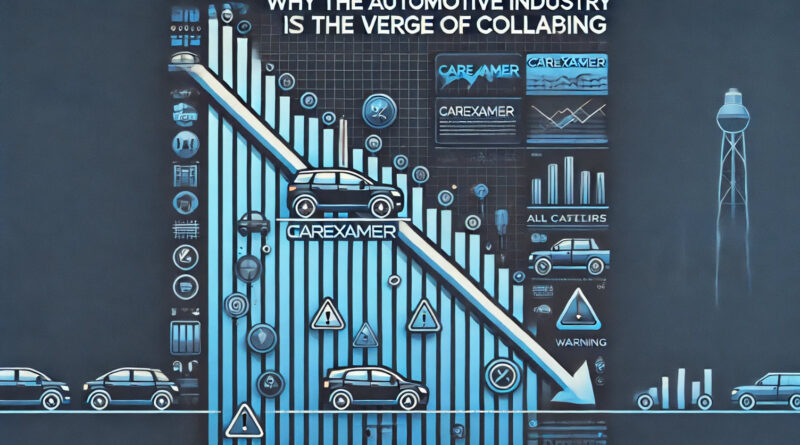Why the Automotive Industry is on the Verge of Collapsing
Here’s a closer look at why automotive industry collapsing how it could happen and what’s driving it. The automotive industry, once a powerhouse of innovation and economic stability, is now facing a crisis that could reshape its future. From economic struggles and changing consumer habits to tougher environmental rules and tech disruptions, the industry is feeling the heat from all sides.
Economic Volatility and Rising Costs
Let’s start with the money problems. Inflation is up, raw materials cost more, and supply chain hiccups are driving up the price of making cars. On top of that, the ongoing chip shortage—an issue that started during the pandemic—continues to wreak havoc on production schedules, leading to delays and higher costs.
Consumers aren’t having an easy time either. With interest rates soaring, fewer people are taking out loans for new cars. Shrinking disposable income means folks are thinking twice about splurging on big-ticket items like a new vehicle. The result? Fewer sales and a lot of stressed-out car companies.
Shift in Consumer Preferences
People’s attitudes towards cars are changing fast that what media narrative and financial organisations are saying. Media narrative also driving view many urban dwellers are ditching car ownership for ride-sharing apps like Uber and Lyft, especially in crowded cities its sounds like propaganda. It’s simply always has been a fact if you live in central London you don’t really need a car very simple as its faster to move via public transport around.
Another narrative what keeps circulating around is younger generations, in particular, seem more interested in experiences than possessions, and owning a car just doesn’t top their list anymore. Answer to this is younger generation stil want possessions just they don’t have ability to pay for the possessions right out and simply using market manipulation tactics like car finance or car leasing which some institutions simply try to manipulate and rename same methods of car ownership as subscription service etc it’s like reinventing the wheel and think consumer is stupid.
Then there’s the push towards electric vehicles (EVs). While EVs promise a cleaner, greener future, they’re still pretty pricey, and the charging infrastructure isn’t where it needs to be yet and never will be as in capitalism and green environment doesn’t work hand in hand unless current system will be superseded by different system like socialist system with tyranny control element within. Batteries’ longevity concerns don’t help either. This puts the industry in a tough spot: traditional gas-powered cars are still preference to most consumers worldwide and will be for forcible future, but the EV market isn’t quite ready to carry the torch. In our opinion it’s US worldwide plot to make oil complacent and not allow oil dominant counties to control the oil market and pay for oil in different currencies as The US’s landmark pact with Saudi Arabia expired 2024. It was the deal made in the 1970s by Wall Street bond dealer extraordinaire, William Simon.
Environmental and Regulatory Pressures
Governments around the world are cracking down on emissions to tackle climate change, and carmakers are feeling the pressure. Meeting these strict regulations isn’t cheap—it takes a ton of investment in research and development. Smaller manufacturers, in particular, are struggling to keep up and are being forced to merge, sell, or shut down entirely.
Consumers are also holding companies accountable. People are more eco-conscious than ever, and automakers that don’t prioritize sustainability are getting called out. This added scrutiny isn’t just a PR headache; it’s a real threat to their bottom line.
Technological Disruption
This would currently not apply to current situation. The pace of tech innovation is both exciting and terrifying for the automotive world. Self-driving cars, smart car technology, and advanced driver-assistance systems are all changing how we think about transportation. But here’s the catch: developing these technologies costs a fortune, and the payoff isn’t guaranteed.
Tech giants like Tesla, Google, and Apple are jumping into the mix, bringing deep pockets and cutting-edge expertise. This makes it even harder for traditional carmakers to keep up.
Supply Chain Challenges
The global supply chain is a mess, and the auto industry is paying the price. The pandemic exposed just how fragile these systems are, with factory shutdowns and shipping delays becoming the norm. Add geopolitical issues like the U.S.-China trade tensions and the conflict in Ukraine, and you’ve got a recipe for chaos. Getting the parts they need has become a major headache for automakers.
A Path Forward?
All is not lost—yet. The industry can still turn things around, but it’ll take some bold moves. Here’s what needs to happen:
- People have to obtain more income.
- Government worldwide should stop making biased policies
The automotive industry is at a make-or-break moment. The challenges are huge, but so are the opportunities for those willing to adapt. With the right strategies, the industry might not just survive—it could thrive in a world that’s changing faster than ever.
Buying a used VW. Buying used vauxhall, BMW, Jaguar, Ford, Volvo, Range rover, Bentley, Aston Martin, Porsche, Ferrari, Lamborghini, Maserati, Hyundai, Tesla, Honda, Pagani

